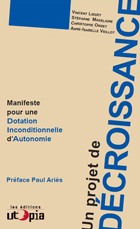Published in Les Z’indigné(e)s n° 16, June 2014. The idea of “Protectionism” recurs often when we are trying to imagine solutions to face up to the horrors of Liberalism. Our friends from the Left often prone it and, even though we might share their approach, it is not without any reservations. As Growth Objectors, we remain prudent, not only with regard to their diagnosis and proposals, but also with the term itself for many reasons.
The idea of “Protectionism” recurs often when we are trying to imagine solutions to face up to the horrors of Liberalism. Our friends from the Left often prone it and, even though we might share their approach, it is not without any reservations. As Growth Objectors, we remain prudent, not only with regard to their diagnosis and proposals, but also with the term itself for many reasons.
Protectionism reflects a society of fear… we must free ourselves from this domination by the oligarchs and the Far Rights:
With the intensification of austerity plans imposed by the imposture of public debts, our societies are dominated by legitimate economic fears: fears of being downgraded, of loosing one’s job, of being unable to make a loan repayment, for the children’ future, etc. The answer to these fears cannot be the object of a simplistic reaction: to seek protection. To protect oneself from whom and from what? Every one suffers the social, human and ecological disasters of this abhorrent oligarchic and productivist system. We cannot get out of it by simply reacting to a problem. We do not feel comfortable with the term “protectionism” because it can be in line with simplistic and demagogic speeches from the Far Right, thus by-passing the in-depth debates: the anthropological crisis.
It is not a matter of regulating the economy but to get out of the religion of the economy:
We live in a society, which is culturally dominated by money, competition and competitiveness and our imaginaries are colonised by homo-economicus. Yet, the problem is not to find palliatives to dampen the economic tyranny but to get out of it and to free ourselves from these addictions, to “walk on the wild side” and to question the meaning of what we produce rather than protecting their localisation. It is a question of return to the real questions: the meaning we give to our lives, our productions, our consumption and exchanges.
Not being on the defensive any more: that is what the term protectionism implies, but, on the contrary, building and re-appropriating hope by turning to new paradigms:
It is not a question of throwing crumbs here and there to safeguard some jobs, it is even less a matter of re-industrialising over so called” developed “ societies. Thus, unlike what is proposed by sustainable development to address ecological issues, it is not a matter of “polluting less to pollute longer”, to “provide protection for a greater production of useless crap under undignified conditions”. It is a matter of initiating transitions towards new societal models that are at once ecologically sustainable and socially just, convivial and autonomous.
For these three reasons, we remain critical and prudent with the term “protectionism”, which is too defensive and part of the system. We prefer to talk about “open re-localisation”.
Our proposal to re-localise productions is not meant to protect ourselves from or against “others”, but really to give our societies some meaning back.
An energy and environmental or ecological meaning:
Our societies developed without any consideration for distances: cars, planes, container ships but also communications seem to have reduced them. However the energetic waste is phenomenal, the time and human intelligence wasted also. This operating mode creates pollution, unhealthy traffic jams, accidents and ill being. This territorial planning does not spare them. Taking into account the ecological question leads us all to question the meaning of our productions and to re-localise the productions where possible.
A human meaning: between conviviality and degrowth in inequalities and dominations:
Producing, trading and consuming at the local level, means changing our relation to the “other”, to the tool and the environment. We live under the illusion of power, an illusion of freedom to consume and individualism: the word is organised in such a way that we are never confronted to the environmental or humane consequences of our consuming actions. This “banality of the evil” nourished by denial makes us accept the exploitation in undignified working conditions and the terrible environmental consequences we would refuse if they affected our children, family members, neighbours or our countries.
For a re-localisation but an open re-localisation, because openness is solidarity, sharing, hospitality and intercultural exchanges:
We live in an unprecedented complex globalised world that engenders monstrous technological interdependencies in resources and productions. Within the logic of a democratic and serene transition, supported by Degrowth, we will need solidarities, consultations, some openings, and helping hands.
Inward looking, re-localised communities are neither desirable nor are they options for the future. On the contrary, we need to open ourselves up to the others to share the cultural richness, exchange experiences, know-hows and life skills… that is: Buen Vivir endorsed by Degrowth. That is the way to provide a collective protection from all forms of domination and to free ourselves from the economy and the fears it fuels.
Whereas “protectionism” might dodge the real problems and nurture the illusion of false, simplistic solutions such as withdrawal onto oneself or the nation, we prefer an open re-localisation of our productions and our lives as signs of conviviality, social and environmental justice underpinned by solidarities.
Vincent Liegey, Christophe Ondet, Anisabel Veillot, Stéphane Madelaine et Thomas Avenel for the collective « A Degrowth Project ».
A Degrowth Project: Manifesto for an Unconditional Autonomy Allowance (UAA), Écosociété, Montreal / Utopia, Paris / Icaria, Barcelona.
 “ […] the prerequisite for the transfromation of the economy is “ a strong adhesion from all and a participation to this desire for change”. That is the least … But we have to start somewhere and this stimulating book contributes to it undoubtedly”. Hervé Kempf in Le Monde.
“ […] the prerequisite for the transfromation of the economy is “ a strong adhesion from all and a participation to this desire for change”. That is the least … But we have to start somewhere and this stimulating book contributes to it undoubtedly”. Hervé Kempf in Le Monde.
“ And the success of the book may suggest that “transition is well underway”. Emmanuel Daniel in Slate.fr.
And also:
- « A Degrowth Project » in Libération: Vincent Liegey : “We can no longer grow in a finite world”
- « A Degrowth Project » in « Le Monde »
- The transition is underway! – In Reporterre.net
- Vincent Liegey : “The freedom to consume is a costly illusion” – A Degrowth Project in Bastamag.
- Momentum Institute analyses Basic Income / Unconditional Autonomy Allowance: « Living income for free and egalitarian societies »
- « A Degrowth Project » : Yesterday’s utopia has become today’s reality!



Ping : Protectionism and Degrowth? For an open re-loca...